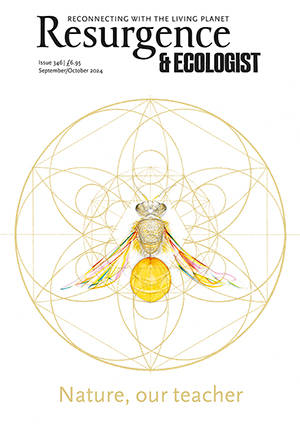How should contemporary writers of place and Nature confront environmental crises? Is it possible to write lyrically about the natural world when everything you describe is under threat? And what of the personal elements that often surface in narrative non-fiction? Why should anyone care about a writer’s individual trauma in an age of mass extinction? In Cairn, Kathleen Jamie shows us with supremely artful understatement exactly how to address these challenges, subtly fusing the personal and the polemical, the local and the global, the momentary and the epochal.
Jamie began her writing career as a poet, but has found her widest readership as an author of essays on Nature, landscape, memory and time. The poetic precision of her prose has often been noted, but in Cairn she goes further, collapsing the distance between forms almost entirely. The 42 pieces collected here are all very short, many of them no more than a page. Some – ‘Lost Geese’, ‘A Sunlit Weir’ – describe, in prose, moments that could readily have sparked a poem. Others – ‘The Night Wind’, ‘Memorial’ – are poems, arranged in regular stanzas, while still others, such as ‘Moor’, are ambiguous creatures of the formal limen. This is a new way of writing for Jamie, she explains, developed as she approached the age of 60. She has assembled them here as a “cairn of sorts”, each small fragment slotted carefully against the next to create something far greater than the sum of its parts.
The overarching theme is loss – the inevitable loss of one’s parents to old age, and terrifying environmental loss, with the two sometimes intertwining. As Jamie and her siblings clear out their late parents’ bungalow during “the hottest June on record” they find themselves weeping, as much for the vanished weather patterns of their childhood summers as for their immediate bereavement.
The places described in the book are often left nameless – though there is a clear rootedness in Jamie’s native Scotland. But there are also forays further afield. She returns to Hvalsalen, the ‘Whale Hall’ of Bergen’s Natural History Museum, which she first described in 2012’s Sightlines, to view a new exhibit: the skeleton of a Cuvier’s beaked whale, and the mass of plastic bags found clogging its stomach, “crimped and scrunched with just a hint of artfulness”.
Jamie’s prose is restrained, and her intense and original images are captured with great economy: a hillside crowd of white butterflies flutter around her “like a shredded contract”; and a buzzard rides the wind with folded wings “like an anvil in the air”. She makes frequent use of the second person – always a good way to mitigate the solipsism latent in the personal essay. But the ‘you’ here is not always addressed to the reader, or to the author herself: sometimes it is angled to an unnamed other – a departed parent again, perhaps, or a member of a younger generation, for Jamie is looking urgently forward as well as back.
One of the longest pieces in the book is ‘The Handover’, an account of a climate justice protest in Glasgow the author attends with her 20-something son and his friends. This prompts reflections on the equivalent campaigns of her own youth, and the observation that CND (Campaign for Nuclear Disarmament) badges – once ubiquitous on student backpacks – have all but vanished, like some farmland bird species, without our noticing the extinction. She finds that her son’s generation, and even some of her own contemporaries, are now largely unconcerned by nuclear weaponry or NATO membership. The difference for the new generation, a friend observes, is that “the Bomb has already detonated. Climate change is actually happening.”
So, what to do? In the end, Jamie is clear: “We can’t stand around like innocents, slightly unsettled, scrolling on, wishing things were ‘back to normal’,” she writes. This is a book about bereavements, large and small – for a cairn can be a gravesite as well as a way-marker or a beacon. But Jamie, going anything but gently into her seventh decade, also issues us with a firm imperative: continue.
Cairn by Kathleen Jamie. Sort of Books, 2024. ISBN: 9781914502002






